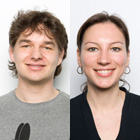
The recently graduated researchers will use the grant to gain research experience abroad.
Two novice researchers attached to the Faculty of Earth and Life Sciences of the VU will do research abroad. This is possible thanks to the Rubicon program of the Dutch Organization for Scientific Research (NWO). The VU-winners are Natalia Goriounova (IN) and Arthur de Jong (FGA). With Rubicon newly graduated scientists can gain research experience at leading international institutions abroad.
Search for new treatments for epilepsy
Natalia Goriounova wil work for 24 months to the Institut National de la Santé et de la Recherche Medicale (INSERM) in Marseille. She will do research on possible new treatments for epilepsy. Epilepsy is caused by an imbalance between stimulatory and inhibitory activity of the brain. Goriounova is studying receptors in the brain of epileptic mice and epilepsy patients. Medication that affects the functioning of these receptors could reduce epilepsy.
Molecular computers in the brain
Arthur de Jong will spend two years at the Department of Neurobiology at Harvard Medical School in the United States. He will investigate how “molecular computers” in the brain are functioning. Communication between neurons take place in specialized contact points, the so-called synapses. These synapses process and store information in the brain and are thus the ‘computers’ that learn and care for memory. Dysfunction of synapses can cause various neurological disorders, such as autism and depression. De Jong examines how these molecular machines work in the brain.
Rubicon
102 researchers in the Netherlands submitted an application for Rubicon. Twenty of them – ten women and ten men – now receive funding. Rubicon is named after the river that Julius Caesar crossed before he began his series of victories that eventually led to the famous “Veni, vidi, vici ‘. Rubicon is seen as a springboard for a Veni grant from NWO. The recipients can use their funding from Rubicon for 24 months of doing research. The level of funding depends on the destination and duration of stay.